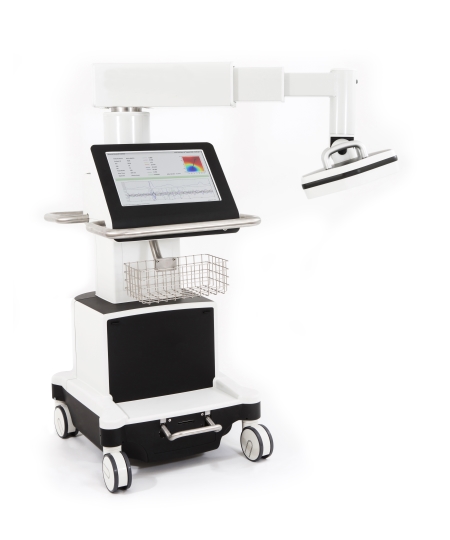- Vitalscan is currently in clinical trials in four major hospitals across the UK
- Technology uses magnetocardiography technology to detect a heart is functioning properly
- By ruling out further tests, it is estimated the NHS could save £200m a year
- Manufacturer, Creavo Medical Technologies, is hoping to market product to NHS next year
- But frustrations remain around getting innovative products into the NHS supply chain
A university spin-out company has invented a new rapid scanning technology that could rule out a heart attack, or other serious cardiac event, in as little as three minutes, potentially saving the NHS a whopping £200m a year.
Vitalscan is the first offering from Creavo Medical Technologies, a spin-out company from the University of Leeds, and is currently the subject of clinical trials at four major UK hospitals – Sheffield, Nottingham, Leicester and Bristol.
It uses magnetocardiography (MCG) technology to perform a simple and passive scan at a patient’s bedside in around 3-5 minutes.
The device produces a trace, numerical data, and a 2D visual magnetic field map of the heart to aid healthcare professionals in the triage of patients presenting at A&E with chest pain.
It can be used by emergency room staff with very little additional training to that needed to perform a routine ECG.
And, in just a few minutes, it can rule out major heart defects instead of hospitals spending thousands on tests before giving a patient the all clear.
What we have could save the NHS 200m every year, but currently there is no mechanism to approach the NHS system as a whole
Steve Parker, chief executive of Creavo, explains: “We have invented a technology that can measure the magnetic field associated with activity in various organs in the body.
“Today, if a patient presents at an emergency department with chest pain, they will follow a pathway that includes a series of tests looking for specific problems. If they find nothing on these, then the patient is OK. With Vitalscan, we have reversed that process.
“In contrast, we are looking to detect a heart that is functioning normally.
“Instead of a person spending 6-24 hours going through all the standard tests, in just a few minutes we will be able to see that there are no serious problems within their heart.”
The impact this could have is huge, as currently around 1.3 million people in the UK present at A&E with chest pain. After tests and processes costing around £1,000-£2,000 per person, 800,000 are told they do not have a series problem.
To equip all A&E departments in the country with Vitalscan, it would cost around £20m, but the savings are estimated at around £200m every year.
“The technology is not invasive, so barriers to adoption are quite low,” said Parker. “And the return on investment is a matter of weeks.”
But, like many other innovative companies across the UK and further afield, he said that fragmentation and varying processes within the NHS mean it is difficult to get products into the supply chain.
You need three things to get into NHS. You need good buy-in at a senior level; clinical adoption through speaking to those who drive the market; and, thirdly, both clinical and economical evidence of its impact. Without just one of these things, adoption will fail
“The whole journey is fragmented in terms of there being different organisations and different funding mechanisms,” Parker adds.
“What we have could save the NHS 200m every year, but currently there is no mechanism to approach the NHS system as a whole.”
The company has worked with key clinical opinion leaders to develop the technology and the current clinical trials will help provide the evidence base for adoption.
Parker said: “I have worked in healthcare for 40 years and there is a disconnect there.
“You need three things to get into NHS. You need good buy-in at a senior level; clinical adoption through speaking to those who drive the market; and, thirdly, both clinical and economical evidence of its impact.
“Without just one of these things, adoption will fail.”
Creavo is waiting for the results of the clinical trials, but hopes to begin marketing the product within the NHS next year.

Vitalscan could reduce the number of unnecessary tests carried out on patients presenting at A&E with chest pain
About Vitalscan
Vitalscan is a battery-powered and portable medical device that can be used in a routine and acute hospital setting while maintaining the accuracy and efficacy of the older technology SQUID devices.
Utilising new imaging technology, it performs a simple and passive scan at a patient’s bedside in around 3-5 minutes.
Benefits include:
1. Ease of use
Testing is completely passive and requires very little training to perform, allowing healthcare professionals to spend time with their patient rather than relying on specialist operators to be on site.
2. Rapid diagnostics
The Vitalscan is a simple 3 – 5 minute test that produces results on site with very high Negative Predictive Value. Healthcare professionals can supplement this information to existing triage protocols to help identify non cardiac patients early in the triage process without waiting for potentially inconclusive lab results.
3. Easily deployable
Without the need for dedicated and expensive facilities and liquid helium cooling, the device can be deployed straight to a patient’s bedside.




